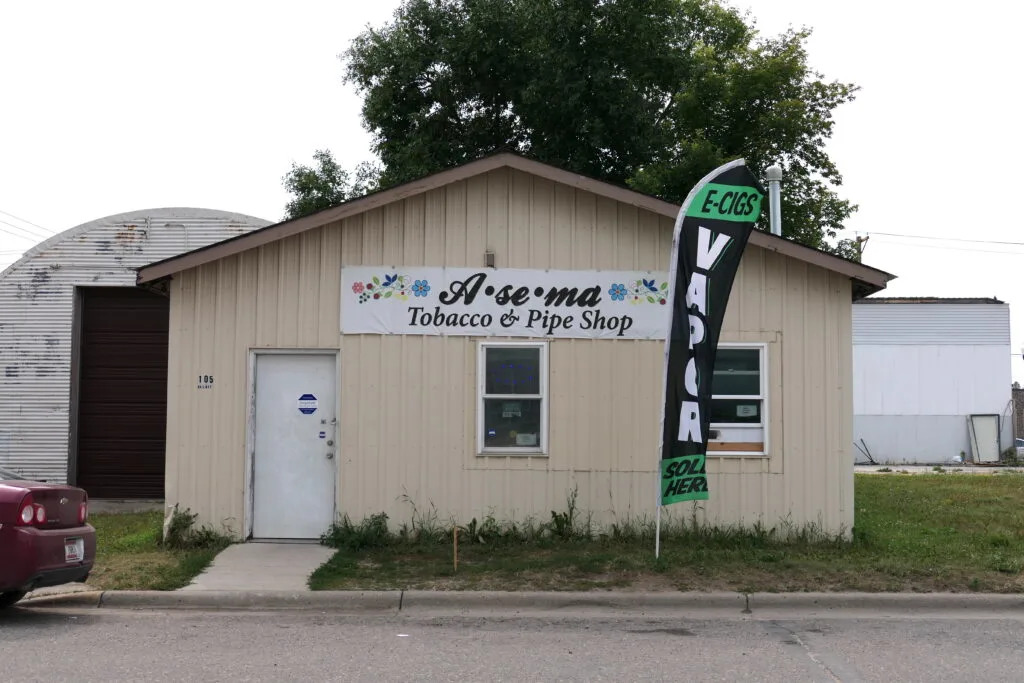Todd Thompson, a White Earth tribal member, sold cannabis from his tobacco store in Mahnomen on the White Earth reservation in northern Minnesota. Photo by Max Nesterak/Minnesota Reformer.
A White Earth tribal member who sold marijuana without a license has been charged with a felony for illegal cannabis possession by the Mahnomen County attorney, launching the first test of the state’s authority to prosecute marijuana crimes on tribal land post-legalization.
Todd Thompson began selling cannabis with four other tribal members from his store, Asema Tobacco and Pipe on Aug. 1 — the day recreational cannabis became legal in Minnesota.
Thompson says the tribe’s effective monopoly on legal cannabis sales at the moment — neither the state nor the tribe has issued sale permits — is holding back regular tribal citizens from a valuable economic opportunity.
“I’m going to fight it,” Thompson said in an interview. “It’s why I did this stuff.”
Thompson and his partners didn’t try to hide what they were doing: Thompson posted a video on Facebook showing large jars of marijuana flower for sale, inviting people to come to his store in Mahnomen.
The next day, Mahnomen County sheriff’s deputies and White Earth tribal police raided his store after seeing the video; an undercover agent purchased cannabis at the store. Authorities seized about 7.5 lbs of cannabis, 433 grams of marijuana wax and $2,748 in cash along with Thompson’s cell phone and surveillance system, according to the charging document.
The felony charge, which carries a maximum sentence of five years in prison and a $10,000 fine, was filed by Mahnomen County Attorney’s Office in April, more than eight months after the raid. Mahnomen Interim County Attorney Jason Hastings didn’t immediately respond to a request for comment.
For Thompson, selling cannabis openly without a license or permission from the tribal council was, in part, a direct challenge to state and tribal regulations. The White Earth tribal council voted just days before the state cannabis law took effect to legalize adult-use cannabis and sell it from a dispensary next to the tribe’s grow facility about a half-mile away from Thompson’s store.
This isn’t the first time Thompson has publicly taunted law enforcement in order to assert tribal sovereignty. In 2015, he was cited for illegally gillnetting on Gull Lake without a permit.
Thompson fought the charges, which were ultimately dropped — years later — after a district court judge ruled that Thompson retained fishing rights on Gull Lake as a citizen of the White Earth Nation.
As in the 2015 fishing case, prosecuting Thompson raises complex legal questions given his tribal identity and store’s location on reservation land.
Minnesota has the power to prosecute tribal citizens for criminal — but not civil — violations of state law on certain reservations including White Earth’s under what’s called Public Law 280.
Under Minnesota’s new cannabis code passed by Democrats last year, adults are allowed to possess up to 2 lbs of cannabis flower in their private residences or up to two ounces in a public place.
The key in Thompson’s case will be determining if possessing large quantities of cannabis is criminal or civil.
In a landmark 1987 case called California v. Cabazon Band of Mission Indians, which ushered in modern Indian gaming, the U.S. Supreme Court decided that “if the intent of a state law is generally to prohibit certain conduct, it falls within (Public Law) 280 … but if the state law generally permits the conduct at issue, subject to regulation, it must be classified as civil/regulatory.”
Yet, in some cases, the state may still pursue criminal prosecutions if the conduct violated the state’s “public policy.”
In 1997, the Minnesota Supreme Court took up a case involving prosecution of a Leech Lake Band of Ojibwe member for underage alcohol consumption. A district court judge dismissed the charge, saying the state didn’t have jurisdiction. But the state Supreme Court disagreed, ruling that state law strictly prohibits underage alcohol consumption because there is public policy interest in doing so.
In Thompson’s case, he said he and his partners only sold to other adults.
State and tribal leaders will note that the regulations for selling cannabis are designed to protect consumers. The White Earth tribal-run dispensary, for example, regularly tests its product to ensure it’s free from contaminants, Chairman Michael Fairbanks said in an interview in November.
The case against Thompson also threatens to upset a delicate balance state lawmakers tried to strike in advancing racial justice and creating a new highly regulated industry. The state is moving to expunge people’s convictions for marijuana crimes while providing people of color a leg up in opening their own cannabis businesses.
Charging a Native American man for possessing too much cannabis smacks of the old regime.
Thompson’s own legal theories of his right to sell cannabis go beyond Public Law 280, which, like many Native people, he believes is illegitimate. He also said the White Earth tribal council overstepped its authority by establishing rules on cannabis sales without putting it before tribal members for a vote. White Earth did pursue medicinal cannabis through a referendum in 2020, but Thompson said that should have been voted on by all six member bands of the Minnesota Chippewa Tribe, not just White Earth.
He also believes the Minnesota Chippewa Tribe constitution grants him the right to sell cannabis because it grants “equal opportunities to participate in the economic resources and activities of the Tribe.”
H/T: www.yahoo.com



